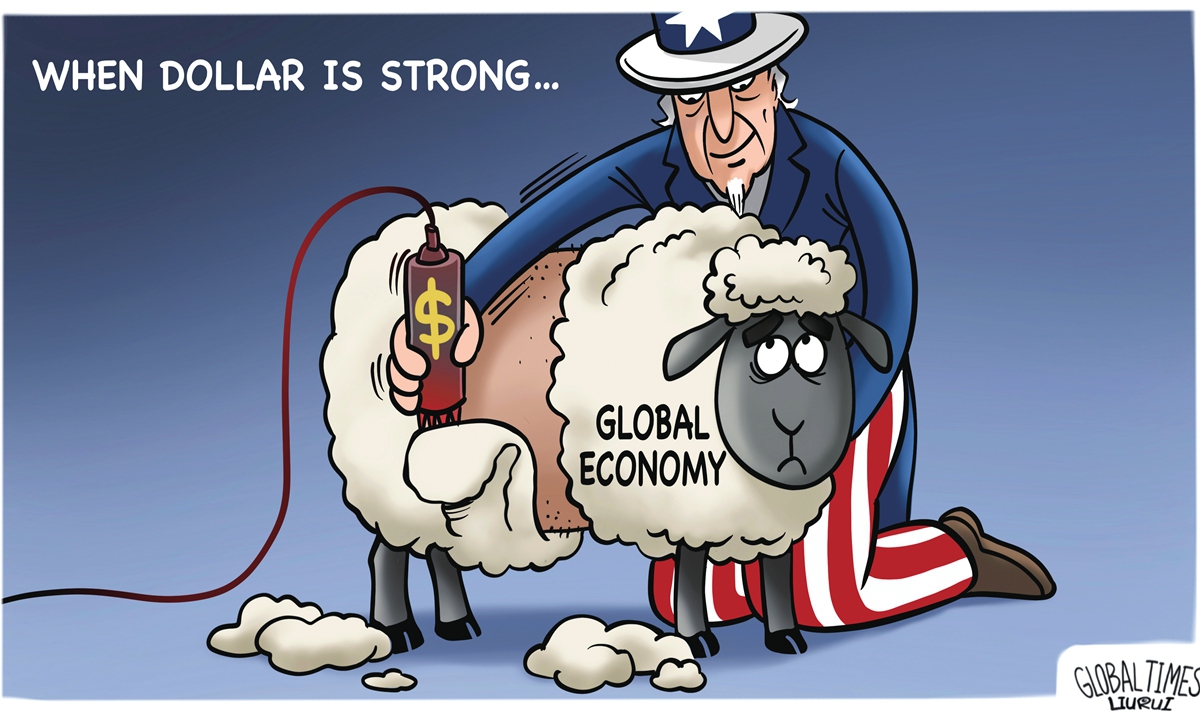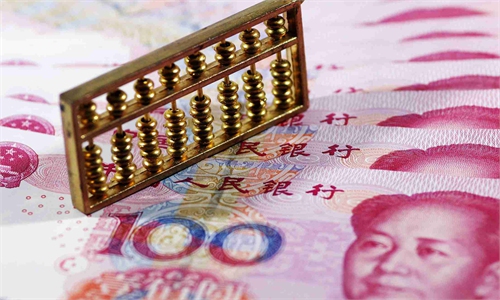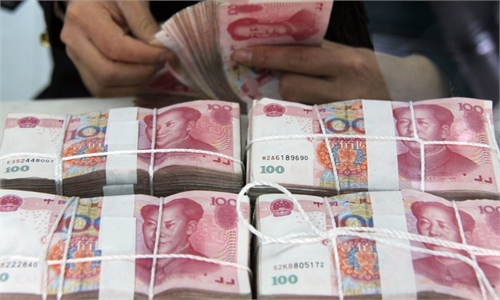
Illustration: Liu Rui/Global Times
With key indicators one after another signaling a re-acceleration of the US economy, there are growing concerns that the long-anticipated US interest rate cuts may be postponed again and won't even happen within this year.If the dollar liquidity squeeze persists amid high interest rates, global financial markets - foreign exchange markets in particular - may need to prepare for another financial storm brought by a strong dollar.
Investors have grown increasingly skeptical as to whether the Fed will be able to cut rates without sparking an inflationary rebound in a strong economy, as there are growing signs that simply don't support rate cut expectations.
US inflation ticked higher in March, with the consumer price index (CPI) rising 0.4 percent month-on-month and 3.5 percent annually, according to new Labor Department data released Wednesday, the Hill.com reported.
Employers added 303,000 jobs to payrolls in March, the US Bureau of Labor Statistics reported on Friday, the largest monthly gain since January 2023. The US unemployment rate fell to 3.8 percent in March from 3.9 percent in February. Unemployment has been below 4 percent, a historically low mark, for more than two years.
Apparently, a strong economic recovery and inflation rebound have greatly tempered expectations for Fed rate cuts this year. To prevent further rebound in inflation, there is undoubtedly a need to have interest rates stay high for a longer period.
That may be why the US Dollar Index rose to 105.1 last week, its highest level since early November 2023.
Even worse, analysts have pointed out that the benchmark 10-year Treasury yield hasn't fallen by anything close to what would be expected if the Fed actually finished hiking interest rates. The 10-year Treasury yield has the potential to keep edging higher for as long as the economy refuses to lie down. The 10-year Treasury yield jumped back above 4.5 percent on Wednesday after March inflation data came in hotter than expected, adding to the likelihood of higher-for-longer interest rates from the Fed, CNBC reported. 5 percent is the next big target once it hits 4.5 percent, Padhraic Garvey, regional head of research for the Americas at ING, wrote in a note on Friday.
The long-term picture doesn't look promising, either. Washington's protectionist measures and geopolitical goals of reshaping global supply chains require massive fiscal spending, which will likely lead to persistent, long-term inflationary pressure.
In that case, interest rates will remain high, resulting in tight US dollar liquidity and potentially triggering a new financial storm across the world, a risk that global markets are increasingly concerned about.
It wouldn't be the first time that a strong dollar has led to capital outflows, exchange rate volatility and debt default concerns in emerging markets, undermining their economic stability and development.
For China, the yuan has clearly been under pressure recently due to the strong dollar. For example, on March 22, the onshore yuan fell to the weak side of the psychologically important 7.2 per dollar level in early trading to hit a low of 7.24, its softest level in four months.
Still, there is no doubt that China has the tools to stabilize the yuan's rate and can use them. For instance, the People's Bank of China kept its daily reference rate against the dollar mostly around 7.09 over the past month, signaling its intention to guide market expectations for a stable yuan.
As of end-March, China's foreign exchange reserves stood at $3.2457 trillion, the world's largest. This means that China can ensure the stability of its currency. Other important tools for stabilizing the yuan include but are not limited to interest rate policy and the foreign reserve requirement ratio.
Yuan stability is important to the stable development of the Chinese economy and the stability of the global financial order.
The stability of the Chinese economy and its financial markets are still the decisive factors determining the yuan's rate. As long as the Chinese economy maintains a long-term positive trend, there is every reason to believe that China can guarantee the general stability of the yuan, even amid the financial storm of a strong dollar, contributing to the stability of the global financial order.



